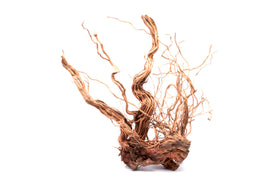
Echinodorus Magdalenensis Tissue Culture
Common Name: Echinodorus Magdalenensis
Echinodorus Magdalenensis is one of the 3 variants similar to Echinodorus Quadricostatus, sometimes referred to as Helanthium Quadricostatus. E. Magdalenensis features long foliage with the classic light green hue. Similar to other swords, Echinodorus Magdalenensis is fairly hearty and can adapt to a wide range of aquarium conditions. This aquatic plant is a great choice for beginners or those who are looking for low maintenance aquatic plants. Care is minimal and as long as a nutrient rich substrate is provided, this aquatic plant will thrive as swords are heavy root feeders. Regular maintenance will also be required as these species are notorious for growing quite large and if left, can potentially shade the lower areas from much-needed light.
With a nutrient rich substrate these plants will tolerate most lighting conditions, but moderate to high lighting is ideal. CO2 injection is not necessary but will help the plant grow faster if desired. Echinodorus Magdalenensis can grow submersed or emersed. Its emersed form may produce lovely white flowers above the waterline.
Notes:
- Echinodorus is a very hardy species of aquatic plants. Most Echinodorus require nutrient-dense soil to thrive as they are heavy root feeders.
- Echinodorus grow fairly large and are more suitable for larger planted aquariums.
- Tissue culture plants are grown in vitro from a state of the art laboratory specialized in propagating aquatic plants. They provide the best option for those who want to ensure that absolutely zero unwanted pests are introduced into the aquarium.
- Remove tissue culture gel before planting. Simply wash the gel away or soak the plant in water and squeeze the gel off with your fingers.
- Do not make drastic changes to the aquarium. Unstable parameters will result in melt and rotting of the aquarium plant.
- For instructions on how to properly plant tissue culture aquarium plants, click here.
- CO2 injection and quality aquarium soil will yield better growth.
Family Name: Alismataceae
Origin: South America
Height: 4-20”
pH: 5-7
Care: Easy
Light: Low to Medium
Co2: Not necessary
Propagation: Split runners and replant
Growth rate: Fast







